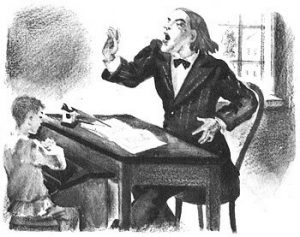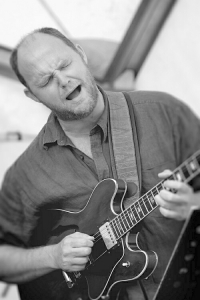Removing the throat clamps
 Often there is the same main problem with vocalists – voice tightness, as a result of the tension of the vocal apparatus (around the neck) – external muscles not involved in the process of sound formation, but always ready to come to the aid of the vocalist – to pull out one or another note, to correct the intonation …
Often there is the same main problem with vocalists – voice tightness, as a result of the tension of the vocal apparatus (around the neck) – external muscles not involved in the process of sound formation, but always ready to come to the aid of the vocalist – to pull out one or another note, to correct the intonation …
At the same time, it becomes difficult to control the voice and the sound quality leaves much to be desired …
But just this interference of external muscles is not desirable …
The internal muscles that are inside the larynx and are involved in sound formation, are able to independently control the voice apparatus without the unnecessary intervention of external muscles.
Signs of intervention in the process of singing external muscles – clamping:
– voice tightness by ear;
– laryngeal tension, which appears externally, as the vertical depression of the Adam’s apple (the higher the sound, the greater the tension and depression)
– the desire to lower the head, to press the chin to the chest (especially in the upper register), and as a result, the inability to sing high with his head raised up;
– rapid fatigue and heavy voice handling.
What makes the clips?
There may be several reasons, but I will describe the main and most common vocalists. It is psychological, and as a result, the habit of singing with a clip. You want to take a difficult note or syllable for you, and strive to do it, by all means. Your singing technique does not allow you to do it correctly, and here those very external muscles (chewing and swallowing) come to the rescue, which help to form a sound worthy of your opinion. The state of fear, shame, shyness, shyness can play a negative role here, because besides you someone else will hear your singing, for example, relatives behind the wall. And you try to sing for them better, but it turns out worse.
How to remove the throat clips?
Since the main and most common cause of the clamp is psychological, you need to force yourself to relax, to divert extraneous thoughts, to concentrate only on your own voice, not to notice anyone in the area and sing freely and comfortably. Approaching the difficult note – do not pay attention to it, say to yourself: “I will sing falsely, I will not take the note, well, let it be.” It is important to force yourself to relax and find those feelings in which you can sing relaxedly.
It often happens that after a certain amount of alcohol consumed – vocal turns into an easy and comfortable. This is due to the fact that under the action of alcohol the central nervous system is dulled, and you no longer make conscious clips to achieve a particular goal. But vocal and drunkenness are incompatible, which means you need to release your fears of sound and in a sober state. For this I will give a few recommendations:
1. Make yourself relax. Inspire yourself that nothing bothers you. You can look and fear in the eyes. For example, invite a mom to the room and tell me that you will sing an arpeggio for her now. Sing it and say that you didn’t work very well, and you’ll look for feelings to sing better. When mom leaves for another room, you may not be ashamed of her anymore.
2. For relaxation, I recommend singing arpeggios “sopranohighc”. This arpeggio, I truly believe the most versatile for the singer, as it teaches us to bind the chest and head voice. Sing a vowel convenient for you. When singing, do not open your mouth hard; do it in half. Only on high notes some expansion of the mouth is allowed. Look straight ahead. Breathe easy. Plug one ear tightly with your finger. This will help you hear yourself well from the inside and suppress psychological stress. Do not increase the volume in upper case. Sing at a moderate volume. When you achieve some relaxation – hook on these feelings. Look for sensations. Then try to sing a song, but at half-volume and not straining in any way, let the sound seem more subtle and less dynamic, but the main thing is to keep it connected, and over time it will come, and the strength and coloring of the voice will become richer.
Signs of relaxed singing:
– the sound is balanced in all frequency components: high, medium and low.
– You can easily sing even the highest notes with your head up.
– when attacking a sound or when it is completed, micro falsetto “cockerels” slip, this symbolizes the softness of the attack and the sound and the freedom of the vocal cords (but this feeling may be absent).
– there is no tension in the abdominals, and there is enough air for singing.
Ideal for relaxed singing is the Seth Riggs “Singing in Speech Position” technique.
And remember, relaxation of the larynx is not a one-day process, but a long one, requiring a lot of time and patience !!! Relax with each lesson more and more …




